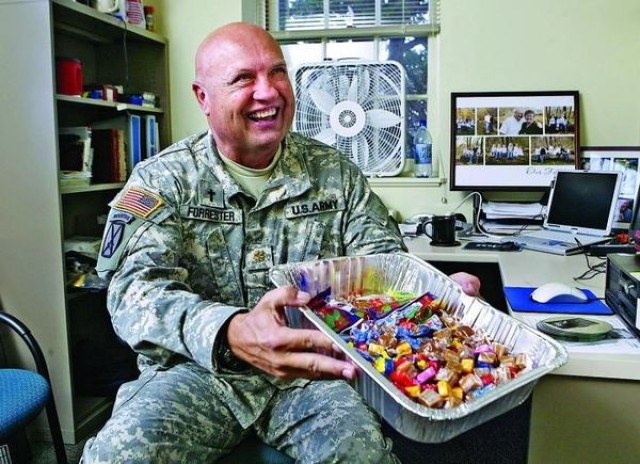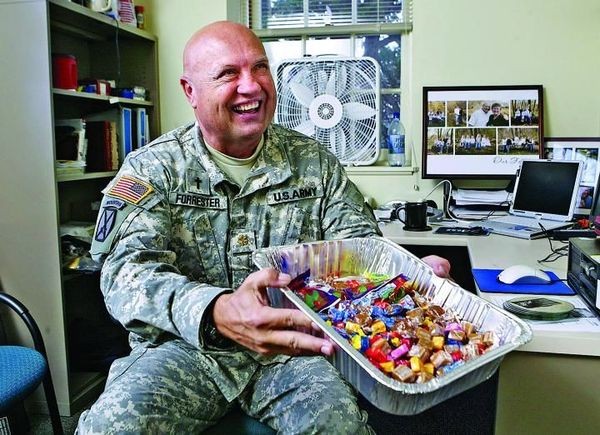
Fort Lewis - For the soldiers of the Warrior Transition Battalion, life has taken an unexpected turn.
They often are too injured to serve with their unit by the time they arrive at Fort Lewis. Their war wounds from Iraq and Afghanistan have inevitably left them with lots of questions: about life, about morality, about spirituality.
Many go to Maj. Dale Forrester, the unit's chaplain since 2008.
"When you have a traumatic experience, questions about faith naturally pop up," said Forrester, who turns 63 this month. "The first one is always: Where is God in this' Is there a God'
"Now we're starting to talk about great, overarching issues, and they're all rational questions: If there is a God, does He care' If He cares, why me' How do I interpret what's happened' What is the meaning of life' Why is there death and injury if there's a good God out there' Why did my buddy die' And why was I spared'"
Forrester is the first to admit he doesn't have all the answers. But the northern California native, who describes himself as a "moderately conservative evangelical Protestant," tries to help the unit's soldiers work through their issues.
A big one is the guilt of waging war.
"I've had soldiers tell me, 'Chaplain, I can never go to heaven. You have no idea the things I've seen, the things I've done,'" he said. "And to be able to talk to that soldier, and help him understand God better, they are then able to forgive themselves."
The Army-wide Warrior Transition initiative was born from the poor medical conditions revealed at Walter Reed Medical Center in early 2007. As the scandal rippled across the country, soldiers at the old "medical hold" companies at Madigan Army Medical Center complained of mistreatment, confusion and delays.
In the newly created battalions, soldiers moved into refurbished barracks and were assigned a primary care specialist, a nurse case-manager and a squad leader to make sure they get proper treatment.
The units emphasize a multi-approach recovery: Treatment for physical and mental wounds is critical, but soldiers also learn new skills to help with the next step of their life.
The battalion has about 445 soldiers on post; those numbers are only expected to increase with three Fort Lewis Stryker brigades deployed overseas.
A second chaplain will arrive soon to help minister to the Warrior Transition Battalion.
Forrester gives most of the credit for working with injured soldiers to the array of case workers who provide mental health support. But while no soldier in the unit wanted to go on the record for this story, several described Forrester's help as a crucial part of recovery.
His assistant credits much of that to the chaplain's ability to relate to younger soldiers.
"He's more laid-back, more down to earth than most chaplains," said Spc. John Dinkins, a 29-year-old Texas native. "He was enlisted for many years. So it's kind of like an ordinary soldier who has become a chaplain."
It may seem an unlikely outcome for someone who didn't grow up particularly religious. Forrester became a Christian in his early 20s.
The pull of military service, however, was there at an earlier age. Friday nights growing up were spent at his grandmother's house, where his uncles swapped stories about fighting in World War II.
Forrester joined the Navy Reserve as a 17-year-old high school senior in 1963 and went active-duty after graduation. He served eight years as a sonar technician and rose to the rank of petty officer first class.
He attended college and then seminary after his time in the service. He was ordained through Grace Place International, a Colorado-based church, and later served as a community pastor. The urge to return to the military did not fade, and he joined the Army Reserve as a chaplain when he was 36. He switched to active-duty less than a year later.
He retired in 2001, at age 52. He spent time overseas as a missionary and later served as a pastor at Rainier View Christian Church in Parkland. He and his wife eventually settled in Brush Prairie, Clark County.
Two years ago, he heard the Army was seeking retired chaplains to come back to serve the 35 warrior transition units it was standing up across the country. He was intrigued but unsure.
"If the Army calls us and says, 'We want you at the Warrior Transition Battalion at Fort Lewis,'" he told his wife, "then we'll know this is what we're supposed to do."
The Army called him three weeks later.
He packed his belongings in an old motor home, parked it on North Fort Lewis and has been living in it for the past year while he and his wife look for a home.
By Forrester's calculation, it was his 28th move in 39 years.
He is set to retire in May 2011, just shy of his 65th birthday. But he hedged a bit: If the Army offered a "dream job" like ministering to wounded soldiers at the hospital at Bagram Air Base in Afghanistan, he said he could be convinced.

Social Sharing